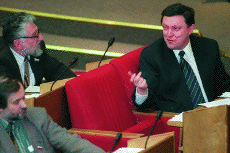|
Russia's new constitution, written by Yeltsin's team, was
narrowly approved in December 1993. Yet even after Russians
elected the 1993 and 1995 State Dumas under the Constitution
written by Yeltsin, the Clinton administration continued
to ignore the newly elected members of the Russian legislature.
The consistent excuse they provided for this was that the
1993 and 1995 Dumas, too, were "Communist-dominated."
In fact, the most consistent opposition to the Yeltsin regime
came not from the Communist Party of the Russian Federation,
or even from Vladimir Zhirinovsky's ultra-nationalist Liberal
Democratic Party of Russia, but from the pro-democracy,
pro-reform Yabloko party.35

NARROW FOCUS: Grigory Yavlinsky,
right, the leader of the pro-reform Yabloko party,
speaks with Deputies Igrunov and Sheinis in the State
Duma, the Russian parliament's lower house, March
15, 1996. The Clinton administration strongly favored
Yeltsin against Yavlinsky and all other contenders
in the 1996 Russian elections, despite polls in Russia
showing many voters were unhappy with both incumbent
President Yeltsin and his Communist opponent, Gennady
Zyuganov. In December 1999, merely suggesting Chechnya
peace negotiations earned Yavlinsky a "traitor"
epithet from Clinton troika-favorite Anatoly Chubais,
who had by then become the head of Russia's electricity
monopoly. Chubais was Yeltsin's 1996 campaign manager.
AP Photo/Alexander Zemlianichenko
|
The Clinton troika studiously ignored Yabloko and its leader,
Grigory Yavlinsky, because recognizing that a democratic
party could oppose policies of the Yeltsin government would
have called into question the administration's embrace of
both Yeltsin and Chernomyrdin as the personifications of
Russian democracy. Yabloko's existence contradicted the
administration's repeated assertions that it had no choice
in its Russia policy except to depend exclusively on Yeltsin.36
At the same time, Yeltsin found rule by decree an increasingly
attractive expedient to avoid the hard work of compromise
with the parliament, further undermining the fragile democratic
structures emerging in post-Soviet Russia. As always, he
acted with the unflagging support of the Clinton administration.
Such unquestioning support for the Russian executive stifled
the healthy debate necessary in a democracy, and taught
Yeltsin exactly the wrong lessons about the importance of
representative government in a constitutional system. Worse,
the Clinton administration virtually guaranteed that the
legal reforms needed to establish a genuine free enterprise
system would not be enacted in the Duma, and it utterly
destroyed America's credibility in dealing with Russia's
legislative branch. Worst of all, however, was the role
that the Clinton administration played in undermining the
growth of pluralistic, democratic government in Russia-and
the impetus it provided for the abuses of executive power
by the Yeltsin administration that would shortly ensue.
The Clinton administration justified promoting Yeltsin's
candidacy even in a multi-candidate field by claiming that
it was in the U.S. interest to defeat Communist leader Gennady
Zyuganov. But opinion polls show that both General Alexander
Lebed and Yabloko's Grigory Yavlinsky were also credible
candidates at the time-Zyuganov was hardly the exclusive
alternative to Yeltsin, who had single-digit approval ratings
at the beginning of the year.
Donald Jensen, Second Secretary of the U.S. Embassy in
Moscow from 1993-1995, criticized the administration's simplistic
approach to Russian politics:
The choice was always black or white. The choice was always
reform or going back to the Soviet past. And that, I think,
was oversimplified, did not reflect what was going on in
Russia. And it was something that we began to write about
increasingly and, of course, little attention was paid to
it.52...
Notes
- Yabloko originally supported the war but called for
negotiations--on tough terms--shortly before the election.
Clinton administration troika ally Anatoly Chubais called
Yavlinsky a traitor for suggesting the time had come for
talks. Yabloko lost a number of seats in the new Duma
because of its "soft" stance on the Russian
intervention
Full version:
http://policy.house.gov/russia/fullrussia/fullrussia.html
|